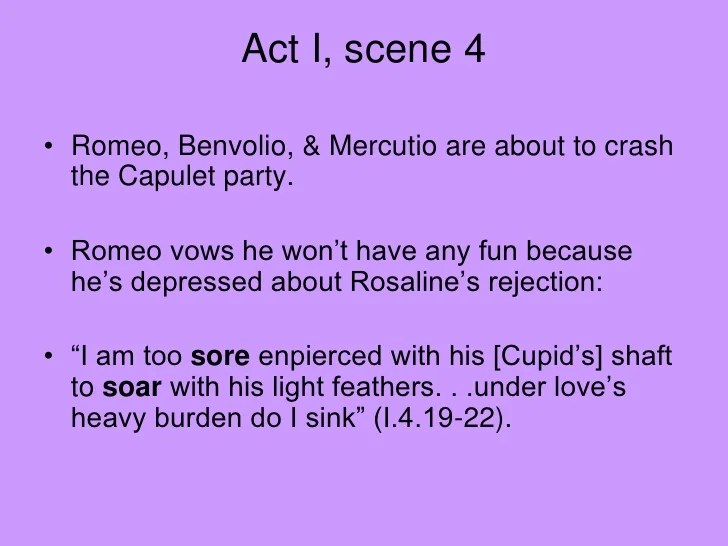Romeo and juliet act 4 quotes – Dive into the heart-wrenching world of Romeo and Juliet Act 4 with our curated collection of quotes. These lines capture the emotional turmoil, reckless actions, and tragic destiny that define this pivotal act.
From Romeo’s impulsive decisions to Juliet’s newfound determination, Act 4 offers a tapestry of unforgettable moments that will leave you pondering the complexities of love, fate, and the human condition.
Romeo’s Characterization
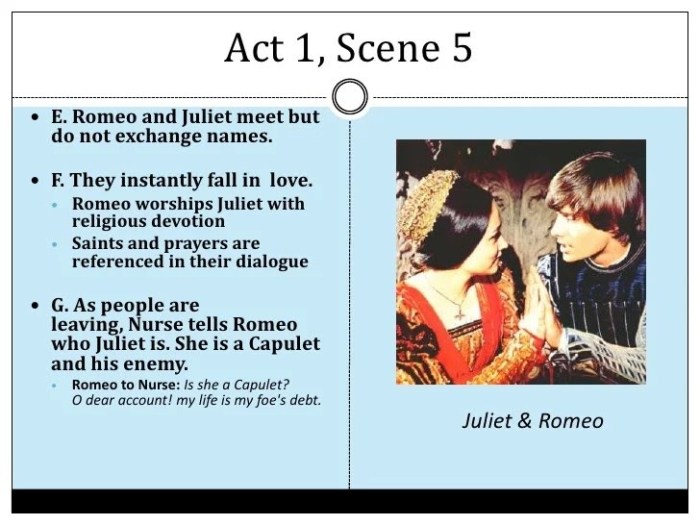
Romeo’s emotional state in Act 4 is characterized by extreme grief, impulsivity, and recklessness. These traits contribute significantly to the tragic events that unfold.
Impulsivity and Recklessness
Romeo’s impulsivity is evident in his hasty decision to kill Tybalt in revenge for Mercutio’s death. He is so consumed by grief and anger that he does not consider the consequences of his actions. This rash act sets off a chain of events that ultimately leads to his and Juliet’s demise.
“Tybalt, the reason that I have to love thee / Doth much excuse the appertaining rage / To such a greeting: villain am I none; / Therefore farewell; I see thou know’st me not.”
– Romeo, Act 3, Scene 1
Romeo’s recklessness is also apparent in his decision to go to Mantua without informing Friar Laurence of his plans. This act of defiance shows his disregard for authority and his tendency to act without thinking. As a result, he is unable to receive the Friar’s message informing him of Juliet’s plan to fake her death, leading to his premature return to Verona and the tragic misunderstanding that ends in his and Juliet’s deaths.
“Had I but time to change this luckless face, / Thou shouldst not know me: ere I change, thou diest!”
– Romeo, Act 5, Scene 3
Juliet’s Transformation: Romeo And Juliet Act 4 Quotes
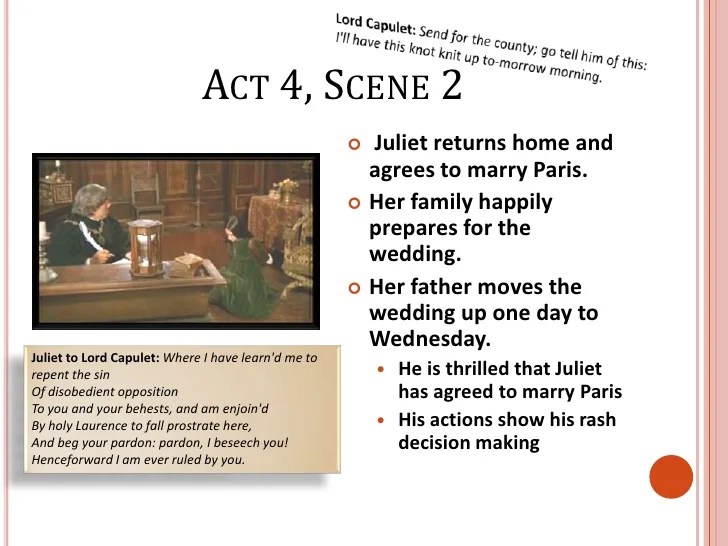
In Act 4 of Romeo and Juliet, Juliet undergoes a significant transformation as she grapples with the consequences of her love for Romeo and the constraints imposed upon her by her family and society.
Faced with the prospect of being forced to marry Paris, Juliet initially seeks the help of Friar Laurence. However, when his plan to reunite her with Romeo fails, Juliet demonstrates her newfound maturity and determination by resolving to take matters into her own hands.
Juliet’s Maturation and Determination
Throughout Act 4, Juliet’s language and actions reveal a shift in her character. She becomes more assertive and decisive, as evidenced by her refusal to marry Paris and her willingness to defy her father’s authority.
-
“I will not marry yet; and, when I do, I swear / It shall be Romeo, whom you know I hate, / Rather than Paris.”
-
“I will follow thee. / My heart is full of woe.”
These quotes demonstrate Juliet’s newfound determination and her willingness to risk everything for her love.
Friar Laurence’s Plan and Juliet’s Choices
Friar Laurence’s plan to reunite Juliet with Romeo ultimately fails, leaving Juliet with no choice but to confront her fate. However, his plan does have a significant impact on Juliet’s choices.
-
“I have a potion that will make you seem dead. / When you awake, Romeo will be here.”
Friar Laurence’s potion gives Juliet the courage to defy her family and to take her own life rather than marry Paris.
In conclusion, Juliet’s transformation in Act 4 is marked by her newfound maturity, determination, and willingness to take risks for her love. Friar Laurence’s plan, while ultimately unsuccessful, plays a role in shaping Juliet’s choices and ultimately leads to her tragic end.
The Power of Fate
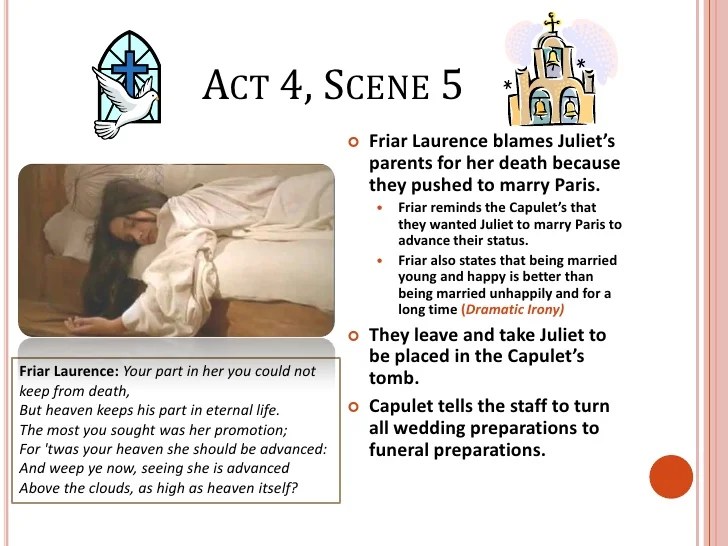
Fate plays a crucial role in Act 4 of Romeo and Juliet, shaping the characters’ destinies and driving them towards their tragic end. The act is filled with ominous foreshadowing and irony, hinting at the inevitable downfall of the star-crossed lovers.
Foreshadowing of Tragic Events
The act opens with Friar Laurence expressing his fears about the potion he has given Juliet:
“If, when thou wakest, thou find thy husband dead,And Romeo banish’d, that he cannot come,Stir not, for then thy life is forfeit too.”
This foreshadows the tragic events that will unfold later in the act, with Romeo believing Juliet to be dead and taking his own life.Another instance of foreshadowing occurs when Juliet’s nurse informs her that Tybalt has been killed by Romeo:
“Tybalt is dead, and Romeo banish’d.”
This news sends Juliet into despair, as she realizes the consequences of her love for Romeo.
Characters’ Actions and Inevitable Downfall
The characters’ own actions also contribute to their inevitable downfall. Friar Laurence’s well-intentioned plan to reunite Romeo and Juliet backfires when the message fails to reach Romeo. Romeo’s impulsive decision to return to Verona to be with Juliet leads to his discovery of her apparent death and his suicide.Juliet’s
decision to take the potion, although driven by love and desperation, ultimately leads to her tragic end. The potion’s effects are unpredictable, and Friar Laurence’s warning that she may awaken too late proves to be true.Fate and the characters’ own actions intertwine throughout Act 4 of Romeo and Juliet, creating a sense of inevitability and tragedy.
The foreshadowing of events and the characters’ choices all contribute to their ultimate downfall.
Thematic Elements
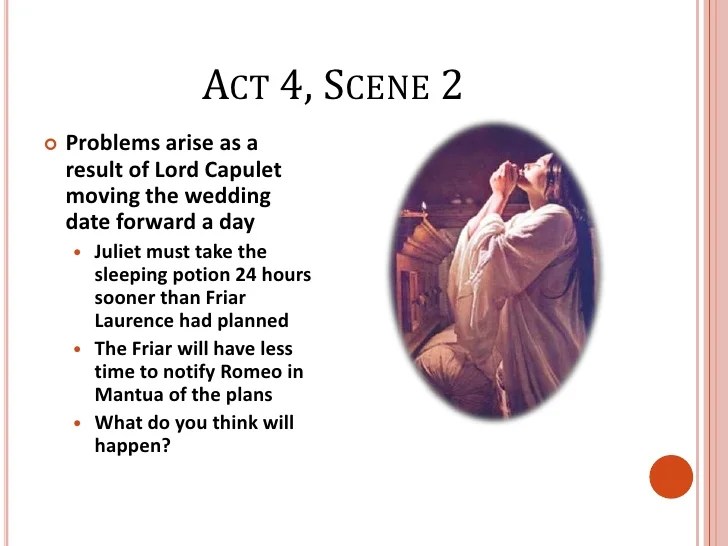
Act 4 of Romeo and Juliet delves deeper into the play’s central theme of love, exploring its transformative power and its destructive consequences.
The powerful words spoken in Romeo and Juliet’s fourth act linger in our minds, reminding us of the intensity of their forbidden love. Yet, beyond the tragic tale of star-crossed lovers, these quotes also resonate with a deeper meaning. They explore the complexities of identity, mirroring the experiences of those who navigate the intersection of African and Latin cultures.
Que significa ser afro latino , a thought-provoking article, delves into the multifaceted nature of this identity, highlighting the challenges and triumphs faced by those who embody it. As we delve deeper into the words of Romeo and Juliet, we find ourselves reflecting not only on their doomed romance but also on the broader tapestry of human identity and the quest for self-understanding.
Forbidden Love and its Consequences, Romeo and juliet act 4 quotes
The forbidden nature of Romeo and Juliet’s love sets the stage for tragedy. Societal norms and family feuds create insurmountable barriers that drive the lovers to desperate measures.
- “If I profane with my unworthiest hand / This holy shrine, the gentle sin is this: / My lips, two blushing pilgrims, ready stand / To smooth that rough touch with a tender kiss.”– Romeo’s passionate words to Juliet emphasize the forbidden nature of their love, as they defy the norms of their society.
- “O, then, begone; be pitiful, and leave me: / For here comes one, my friend, and wanton son, / That loves my person, and will die with me.”– Juliet’s plea to Romeo to leave, fearing the consequences of their discovery, highlights the danger and secrecy surrounding their love.
Social and Cultural Factors
The social and cultural context of the play significantly contributes to the tragedy. The feud between the Montagues and Capulets, as well as the patriarchal society, creates a suffocating atmosphere that restricts individual freedom and expression.
- “My only love sprung from my only hate! / Too early seen unknown, and known too late!”– Romeo’s lament expresses the irony of his love for Juliet, which stems from the hatred between their families.
- “For I have sworn thee faith: / My father cannot choose thee, Juliet.”– Friar Laurence’s warning to Romeo highlights the power of family and societal expectations over individual choice.
Literary Techniques
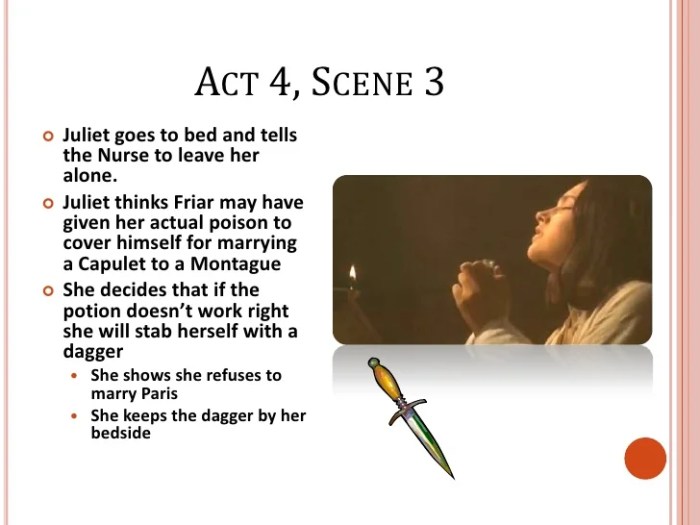
In Act 4, Shakespeare employs a range of literary techniques to create dramatic tension and enhance the play’s emotional impact.
Figurative Language
Metaphors and similes abound in Act 4, enriching the text with vivid imagery and symbolism.
- Romeo’s love for Juliet is described as “a fire that burns my heart.” This metaphor suggests the intensity and passion of their love, which consumes Romeo’s thoughts and actions.
- Friar Laurence compares Romeo’s banishment to a “sea of troubles.” This simile conveys the overwhelming nature of Romeo’s situation, which threatens to drown him in despair.
Foreshadowing and Irony
Shakespeare also uses foreshadowing and irony to create a sense of impending doom.
- The Nurse’s report of Tybalt’s death foreshadows Romeo’s banishment and the subsequent tragedy that befalls the lovers.
- The irony of Friar Laurence’s plan to reunite Romeo and Juliet through a potion is evident when it ultimately leads to their deaths.
Setting
The play’s setting in Verona, Italy, plays a significant role in shaping the characters’ actions and decisions.
- The city’s long-standing feud between the Montagues and Capulets creates a hostile environment that makes it difficult for Romeo and Juliet to pursue their love.
- The proximity of Friar Laurence’s cell to the Capulet tomb provides a convenient location for Romeo and Juliet’s secret meeting, but also contributes to the tragic outcome.
Question & Answer Hub
What is the significance of Romeo’s emotional state in Act 4?
Romeo’s emotional state in Act 4 is marked by impulsivity, recklessness, and grief. His actions are driven by his intense love for Juliet and his despair over her supposed death.
How does Juliet’s character evolve in Act 4?
Juliet’s character undergoes a transformation in Act 4. She becomes more mature and determined, taking control of her own destiny and defying the authority of her family.
What role does fate play in Act 4 of Romeo and Juliet?
Fate plays a significant role in Act 4. The characters’ actions and choices contribute to their inevitable downfall, as foreshadowed by the Nurse’s prophecy and Friar Laurence’s warnings.
